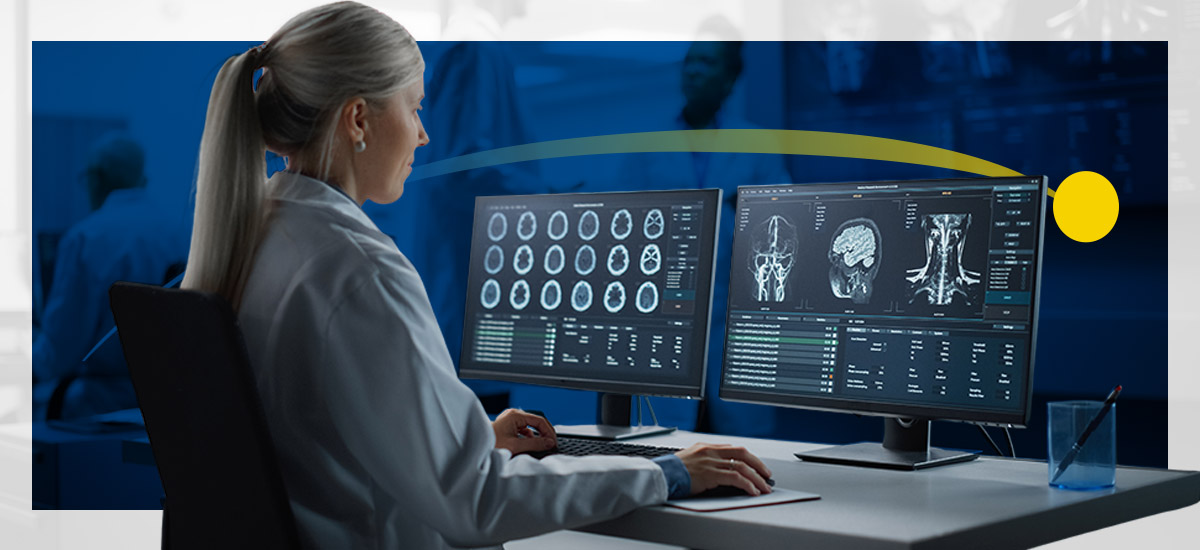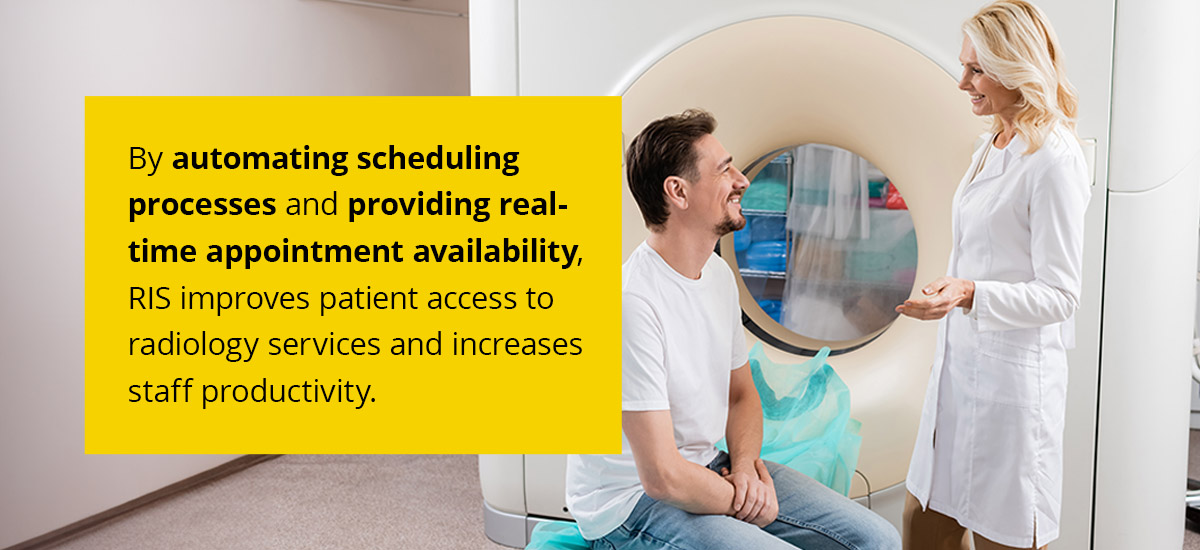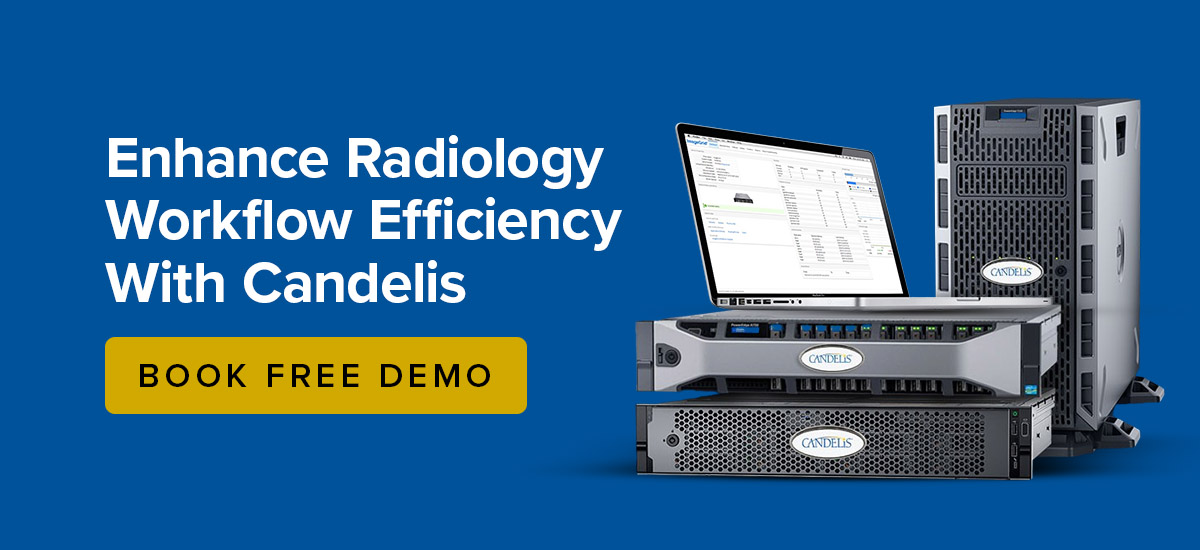What Is a Radiology Information System (RIS)?

In the complex world of radiology, precision and efficiency are priorities for delivering accurate diagnoses and treatments. To achieve this level of accuracy, radiology facilities can utilize various technological advancements. Having the right tools can make all the difference.
One of these tools is a RIS. But what does RIS stand for? RIS is an acronym for radiology information system — a cornerstone of modern radiology practices. With various advanced features, a RIS offers many benefits for patients and radiologists alike.
Learn more about the meaning of RIS and how this software can be a game-changer for your healthcare facility.
What Is a RIS?
In radiology, a RIS, or radiology information system, is specialized software designed to manage administrative and clinical data. It's an integrated database and workflow management tool that handles various aspects of a radiology department. A RIS can manage everything from appointments to patient interaction tracking and report management.
It's helpful to define radiology information systems in simpler terms. Picture the RIS as the nerve center of your practice. It's where appointments are scheduled, medical records are managed and imaging reports are generated. It's also the hub where radiologists, technologists and administrative staff come together to ensure smooth operations and top-notch patient care.
In the broader context of medical systems, RIS stands out for its focus on radiology-related tasks. Let's look closer at a few medical systems:
- Hospital information systems (HIS) and electronic health records (EHR) handle various medical data across departments.
- Picture archiving and communication systems (PACS) receive and store medical images.
- Laboratory information systems (LIS) manage laboratory test results.
- A RIS specializes in radiology-specific duties. It's designed to streamline administrative and clinical workflows and intended to fulfill the radiology clinic demands.
Basic Functions of a Radiology Information System Software
Here are the core features of a RIS that keep radiology departments working smoothly.
- Image Tracking
Image tracking helps retrieve and manage medical images throughout their lifecycle, from when an image is captured to its storage and viewing. Accurate tracking ensures images are readily available for diagnosis and treatment planning. Without RIS imaging and tracking, healthcare providers risk delays in accessing critical imaging data. This delay could impact patient care and outcomes. - Billing
Efficient billing processes are crucial for the financial health of radiology departments. It's no wonder that billing functionality is a core feature of RIS. By automating billing tasks, including invoicing, claims processing and reimbursement management, a RIS streamlines revenue cycles and reduces the possibility of billing errors. This functionality may improve financial performance and ensure regulatory compliance, which protects healthcare organizations' financial stability. - Patient Tracking
RIS software excels in patient tracking, providing extensive tools for monitoring and managing patients' radiology journeys. These tools range from appointment scheduling and procedure tracking to result dissemination. Effective patient tracking features can help improve the patient experience. By offering real-time visibility into patient status and progress, RIS enables healthcare providers to deliver personalized care, minimize wait times and maximize operational efficiency. - Patient Management
Centralized patient management via a RIS combines demographic information, medical history and imaging findings into a single accessible platform. This patient database is an invaluable resource for radiologists, allowing for more accurate diagnoses, treatment planning and follow-up care. - Scheduling
Efficient appointment scheduling is critical for maximizing resource utilization and reducing patient wait times. A RIS can provide advanced scheduling tools that help healthcare providers manage appointments, allocate personnel and improve workflow. By automating scheduling processes and providing real-time appointment availability, RIS improves patient access to radiology services and increases staff productivity. - Results Reporting
Timely, accurate reporting is needed in order to communicate diagnostic results to referring physicians and patients. RIS makes reporting results easier by giving radiologists easy reporting tools for efficiently creating, storing and distributing radiology reports. This feature ensures that crucial diagnostic information is conveyed quickly, allowing for faster treatment decisions and improved patient care coordination. - Storing
Organizations must maintain data integrity, compliance and accessibility, in part through secure storage of medical images. RIS can provide storage solutions that meet industry standards for data security and regulatory compliance.Through reliable image archiving, RIS protects imaging data, reduces the risk of data loss or corruption, and ensures easy access to files for diagnostic reasons. - Sharing
Sharing medical images and reports is essential for collaboration among healthcare professionals and supporting remote consultations. A RIS facilitates interoperability with other healthcare systems to easily exchange imaging data between departments and institutions. This capability encourages interdisciplinary collaboration, enhances care coordination and allows for remote access to imaging resources. As a result, sharing features may help support better patient outcomes and satisfaction. - Interactive Documents
Radiologists can use interactive document features to annotate images, make clinical notes and collaborate with colleagues. Interactive documents can facilitate a comprehensive interpretation of imaging findings. This feature can also improve knowledge sharing among radiology teams and help coordinate interdisciplinary care. By enabling interactive communication and collaboration, a RIS helps with diagnostic accuracy and peer learning and builds a culture of continuous improvement in your radiology practice.

Radiology Information System Benefits
Explore the key benefits of incorporating a RIS into your practice:
- Maximized efficiency: Time is of the essence in radiology, and a RIS is built to maximize efficiency at every turn. From efficient appointment scheduling to automated result reporting, RIS software allows you to minimize wait times and decrease redundancies.
- Improved patient care: RIS imaging systems help with timely diagnoses, personalized treatment plans and smoother care coordination. By centralizing patient data and enhancing communication, RIS software enables providers to deliver the best possible care to every patient.
- Optimized billing: Managing billing and revenue cycles can be challenging. Fortunately, RIS software simplifies this process by automating billing workflows, tracking payments and generating accurate invoices. With a RIS, you can ensure financial operations run smoothly.
- Organized data management: Data is king — and a RIS reigns supreme when organizing and managing this wealth of information. From patient demographics to imaging studies, RIS software provides a centralized platform for storing, accessing and analyzing data.
- Pairs well with other systems: RIS software can integrate with other healthcare systems like PACS. RIS-PACS integration enables access to patient information and imaging studies from a single interface. This accessibility helps reduce the time spent toggling between systems.

Enhance Radiology Workflow Efficiency With Candelis
Candelis is a leading provider of innovative, cost-effective medical data management and PACS solutions. We offer seamless integration with a RIS to enhance workflow and improve service quality provided to radiologists, referring physicians and specialists.
Our ImageGrid™ PACS and DICOM routers are designed to pair perfectly with RIS, ensuring lightning-fast study transfer, efficient image management and comprehensive workflow optimization.
Book a free demo today and learn how Candelis can help your radiology practice enhance efficiency, productivity and quality of patient care.
- Log in to post comments
